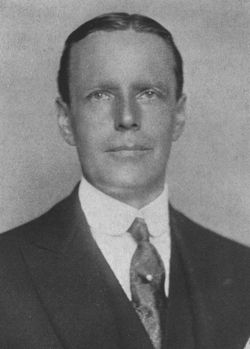Phillips subsequently went to work for the Ambassador to China in Beijing. In 1908, while in China, he was assigned to set up the State Department's Division of Far Eastern Affairs and was made its first chief. In 1909 however, he returned to work in London.
In 1917, he was appointed as Assistant Secretary of State under President Woodrow Wilson and remained in that position until 1920, when he was made the Minister Plenipotentiary to Netherlands and Luxembourg (in residence in the Netherlands).
From 1922 to 1924, he served as Under Secretary of State. In 1924, he was appointed as Ambassador to Belgium, where he remained until 1927, when he became the first Minister to Canada, until 1929.
He served as Under Secretary of State again from 1933 to 1936.
In 1936, he was appointed as the Ambassador to Italy (which was then led by Benito Mussolini), in the immediate aftermath of that country's invasion of Ethiopia. He resigned on October 6, 1941. The following year, he was made chief of the United States Office of Strategic Services in London.
In October 1942, Phillips was appointed as a personal representative of Franklin D. Roosevelt, serving in India. (The United States would not have an official Mission there until the country's Independence in 1947.) Phillips was said to be extremely unpopular with the British due to his pro-Independence views. In 1943, he was made as a Special Advisor on European political matters to then- General Dwight D. Eisenhower, with the rank of Ambassador.
Phillips retired officially in 1944 but returned briefly to diplomatic life in 1945 when he was made a special assistant to Secretary of State Edward R. Stettinius, Jr. In 1946, he served on the Anglo-American Committee on Palestine, opposing the British plan for partitioning the country. In 1947, he was unsuccessful in mediating a border dispute between Siam and French Indo-China.
Phillips subsequently went to work for the Ambassador to China in Beijing. In 1908, while in China, he was assigned to set up the State Department's Division of Far Eastern Affairs and was made its first chief. In 1909 however, he returned to work in London.
In 1917, he was appointed as Assistant Secretary of State under President Woodrow Wilson and remained in that position until 1920, when he was made the Minister Plenipotentiary to Netherlands and Luxembourg (in residence in the Netherlands).
From 1922 to 1924, he served as Under Secretary of State. In 1924, he was appointed as Ambassador to Belgium, where he remained until 1927, when he became the first Minister to Canada, until 1929.
He served as Under Secretary of State again from 1933 to 1936.
In 1936, he was appointed as the Ambassador to Italy (which was then led by Benito Mussolini), in the immediate aftermath of that country's invasion of Ethiopia. He resigned on October 6, 1941. The following year, he was made chief of the United States Office of Strategic Services in London.
In October 1942, Phillips was appointed as a personal representative of Franklin D. Roosevelt, serving in India. (The United States would not have an official Mission there until the country's Independence in 1947.) Phillips was said to be extremely unpopular with the British due to his pro-Independence views. In 1943, he was made as a Special Advisor on European political matters to then- General Dwight D. Eisenhower, with the rank of Ambassador.
Phillips retired officially in 1944 but returned briefly to diplomatic life in 1945 when he was made a special assistant to Secretary of State Edward R. Stettinius, Jr. In 1946, he served on the Anglo-American Committee on Palestine, opposing the British plan for partitioning the country. In 1947, he was unsuccessful in mediating a border dispute between Siam and French Indo-China.
Family Members
Sponsored by Ancestry
Advertisement
Explore more
Sponsored by Ancestry
Advertisement

















